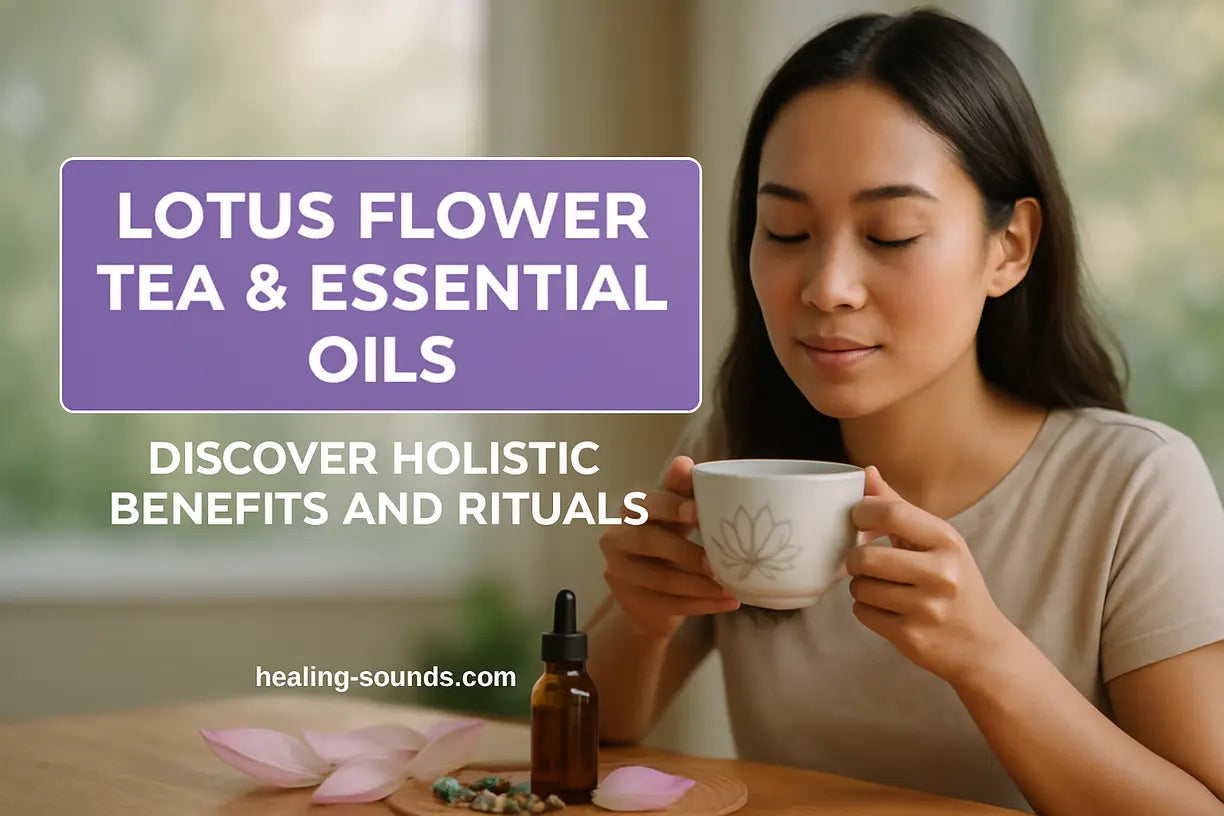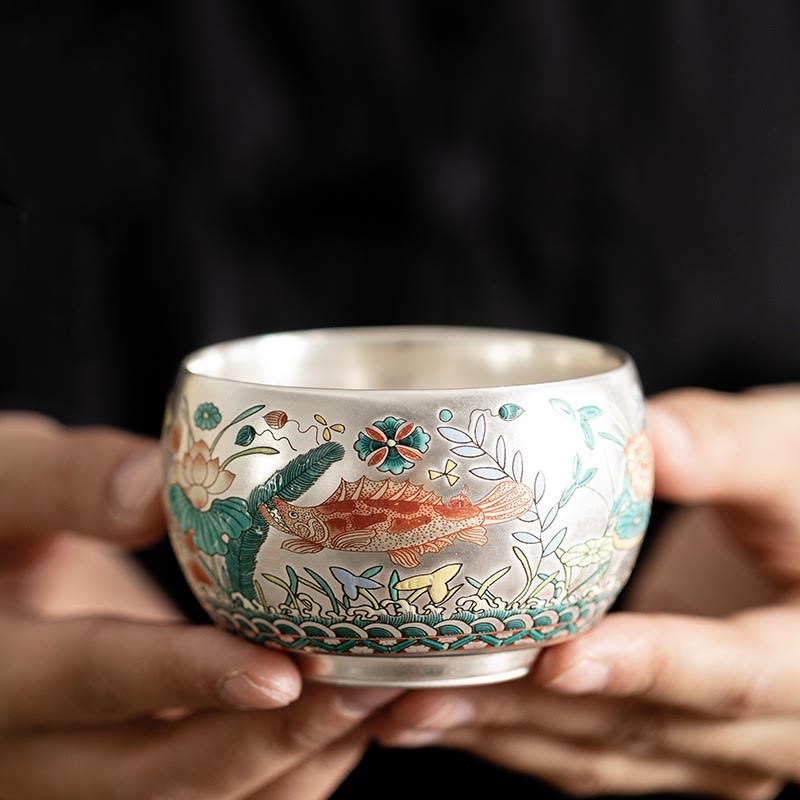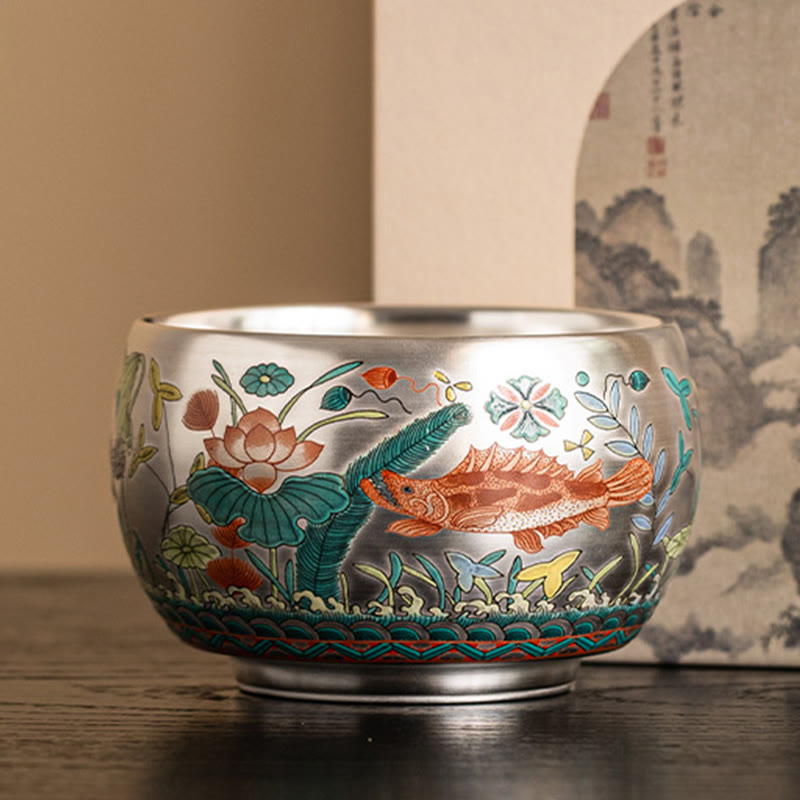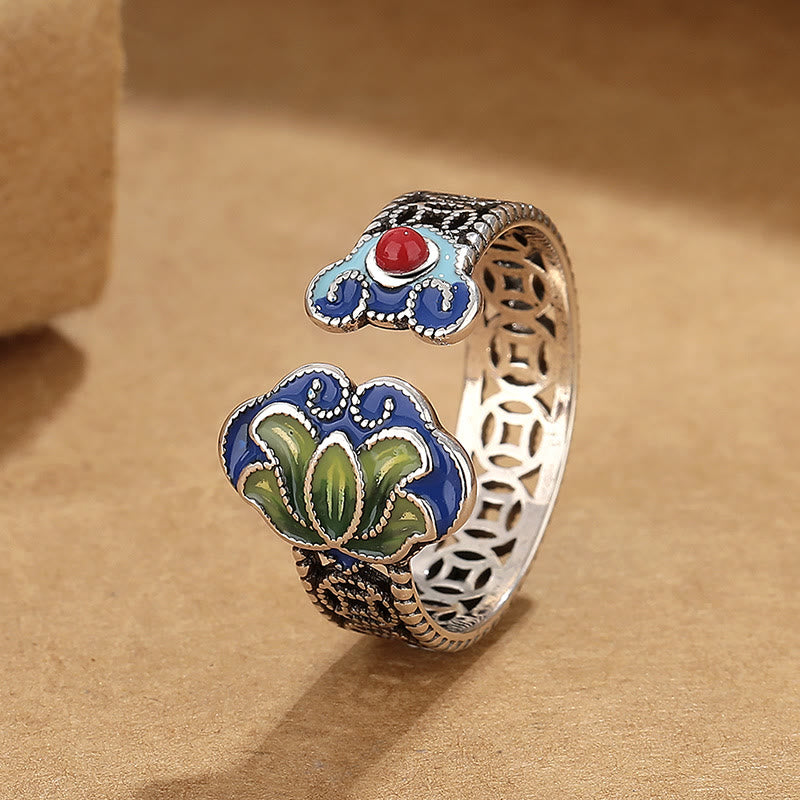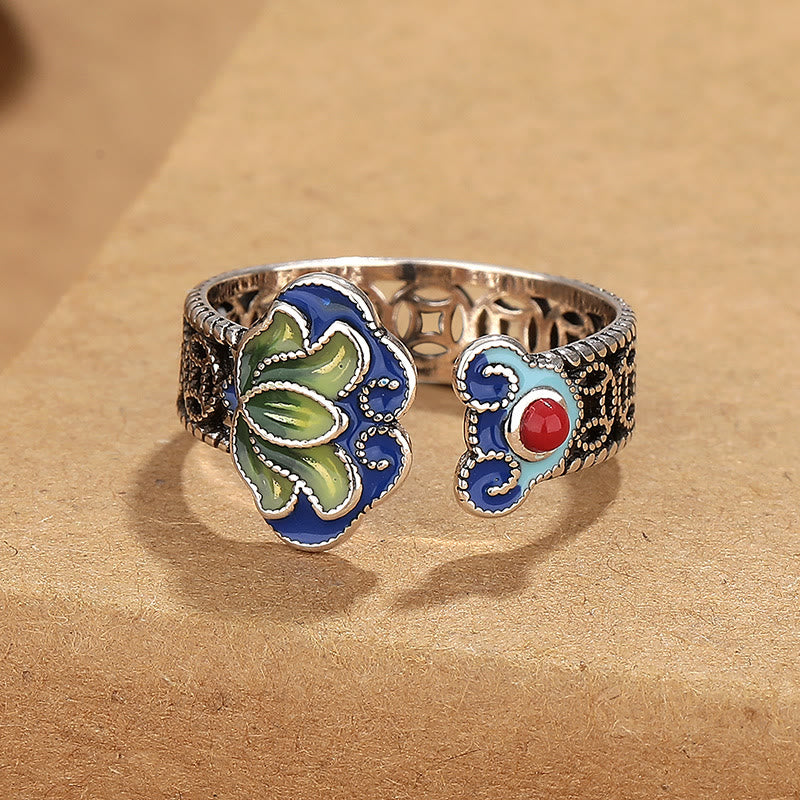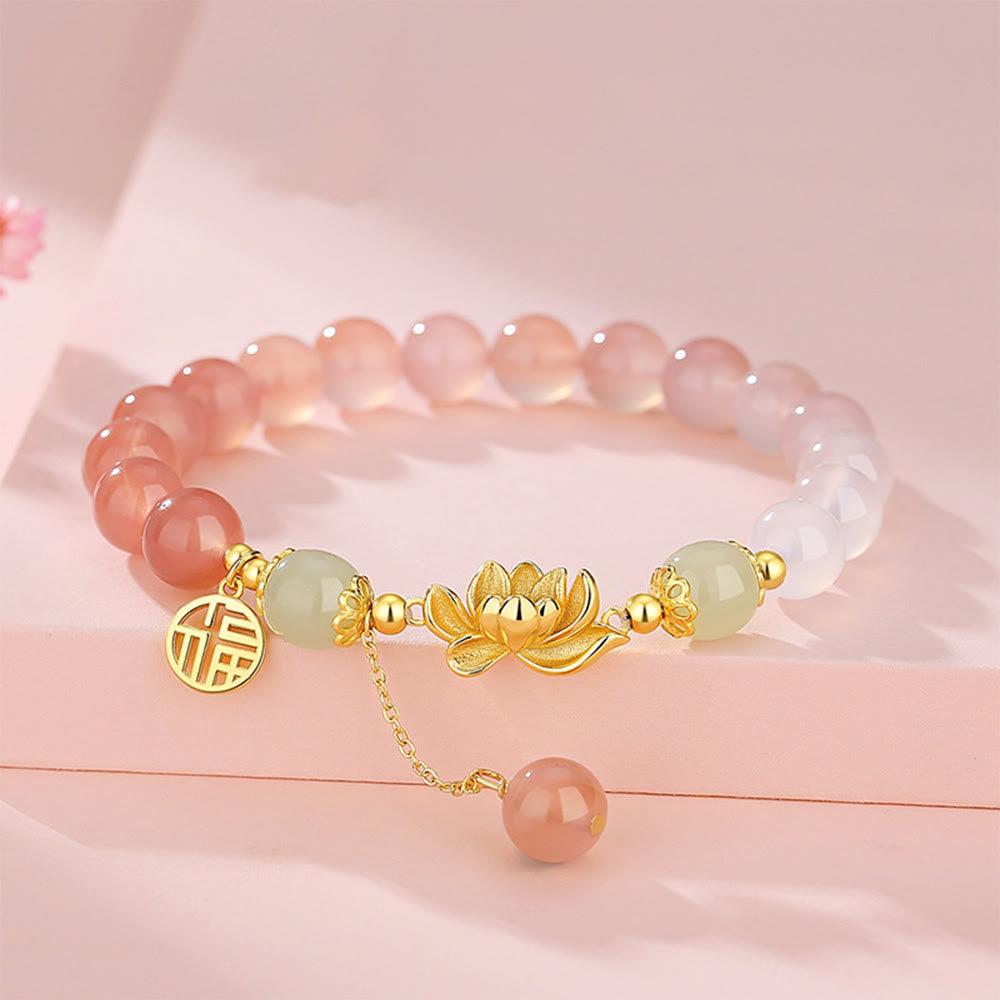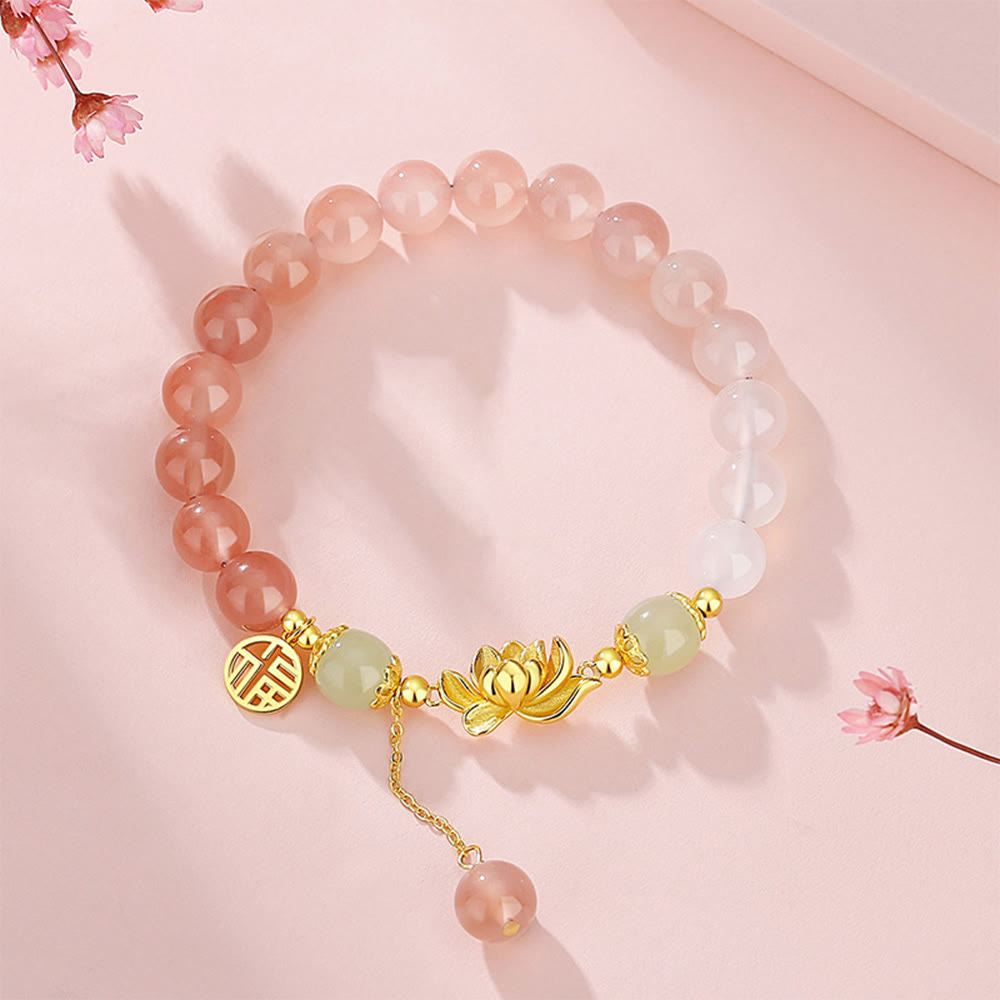La fleur de lotus, symbole intemporel de pureté, d'illumination et de renaissance, est vénérée dans toutes les cultures depuis des siècles. Flottant sereinement sur des eaux troubles, elle en ressort chaque jour immaculée et magnifique, offrant une puissante métaphore de nos propres cheminements spirituels. Au-delà de son symbolisme, cette plante sacrée offre des bienfaits profonds pour le bien-être moderne. Exploiter son pouvoir grâce à l'infusion et à l'huile essentielle de fleur de lotus peut ouvrir la voie à une tranquillité plus profonde, à une clarté mentale et à un équilibre holistique. Si vous souhaitez sublimer vos rituels de soins et vous connecter à la sagesse botanique ancestrale, vous êtes au bon endroit.
Ce guide explore l'univers serein du lotus et révèle les bienfaits uniques de son thé et de son huile essentielle. Nous explorerons comment ces deux formes peuvent être utilisées séparément ou ensemble pour apaiser votre esprit, nourrir votre corps et éveiller votre âme. Préparez-vous à imprégner votre quotidien de la grâce et de l'énergie bienfaisante du lotus.
L'attrait ancestral de la fleur de lotus
Des tombeaux égyptiens antiques aux temples bouddhistes, le lotus occupe une place sacrée dans l'histoire de l'humanité. Il symbolise le voyage de l'âme, des profondeurs boueuses du matérialisme aux sommets ensoleillés de l'éveil spirituel. Ce symbolisme n'est pas seulement poétique ; il reflète les effets tangibles que la plante peut avoir sur notre être. Intégrer le lotus à votre vie est une façon d'honorer cette sagesse ancestrale et d'inviter ses vertus de pureté et de transformation à pénétrer votre conscience. Dégusté en tisane délicate ou inhalé en huile parfumée, le lotus vous rappelle en douceur de vous élever au-dessus du chaos et de trouver la paix intérieure.
Dévoiler les bienfaits du thé à la fleur de lotus
Le thé à la fleur de lotus est une infusion douce et puissante, reconnue pour ses propriétés apaisantes et bénéfiques pour la santé. Infusé à partir des pétales et des étamines de la fleur, il offre une expérience holistique qui nourrit le corps et l'esprit. Plus qu'une simple boisson, c'est un rituel de sérénité.
- Soulagement du stress et de l'anxiété : L'un des bienfaits les plus appréciés de la tisane de fleur de lotus est sa capacité à favoriser la relaxation. Elle contribue naturellement à apaiser le système nerveux, ce qui en fait une boisson idéale pour se détendre après une longue journée ou se préparer à la méditation.
- Soutien cognitif : Le thé contient des composants qui peuvent améliorer la concentration et la clarté mentale. Siroter du thé au lotus procure une vigilance calme et concentrée, sans les effets secondaires de la caféine.
- Riche en antioxydants : le lotus regorge d’antioxydants puissants, tels que les flavonoïdes et les alcaloïdes, qui aident à protéger le corps du stress oxydatif et à soutenir la santé cellulaire globale.
- Harmonie digestive : Traditionnellement, le thé au lotus est utilisé pour faciliter la digestion et apaiser les légers maux d'estomac, favorisant ainsi un sentiment d'équilibre interne.

Créer une cérémonie du thé en pleine conscience transforme une simple boisson en une pratique spirituelle. Choisir un beau récipient pour votre thé peut approfondir cette connexion, transformant chaque gorgée en un moment de pleine conscience.
Tasse à thé zen en céramique avec motifs de dragon et de nature
$47.90 $68.90
Infusez des rituels de thé à la fleur de lotus avec cette tasse en céramique zen peinte à la main, parfaite pour une relaxation consciente et une ambiance spirituelle.
Explorer le produitExploiter la puissance de l'huile essentielle de fleur de lotus
Tandis que le thé nourrit de l'intérieur, l'huile essentielle de fleur de lotus offre des bienfaits thérapeutiques grâce à son parfum et à son application topique. Son arôme floral exotique est reconnu en aromathérapie pour sa capacité à inspirer euphorie, tranquillité et un sentiment accru de connexion spirituelle. C'est donc le compagnon idéal de la méditation, du yoga ou de toute pratique contemplative.
Les principales utilisations de l’huile essentielle de lotus comprennent :
- Aromathérapie : Diffusez l’huile pour créer une atmosphère sereine et réconfortante dans votre maison ou votre lieu sacré. Son parfum apaise les pensées négatives et favorise l’équilibre émotionnel.
- Méditation et pratique spirituelle : Oignez les points de pulsation (dilués avec une huile de support comme l'huile de jojoba ou de coco) avant la méditation pour approfondir votre concentration et favoriser une connexion avec votre moi supérieur.
- Parfumerie Naturelle : Portez son parfum enchanteur comme un parfum naturel qui non seulement sent divinement bon mais favorise également un sentiment de paix intérieure tout au long de la journée.
- Soins de la peau : Lorsqu'ils sont correctement dilués, les antioxydants de l'huile de lotus peuvent offrir des bienfaits rajeunissants pour la peau, aidant à équilibrer la production de sébum et à favoriser un teint clair et éclatant.
Découvrez-en plus sur la façon d’intégrer cette huile précieuse à votre routine bien-être en regardant la vidéo ci-dessous.
Créer un rituel harmonieux du lotus : combiner le thé et l'huile
Pour une expérience holistique ultime, combinez les bienfaits internes du thé au lotus avec le calme externe de son huile essentielle. Un rituel de lotus en pleine conscience peut devenir la pierre angulaire de vos soins personnels, créant une puissante synergie qui nourrit votre être tout entier.
- Créez l'ambiance : Commencez par diffuser quelques gouttes d'huile essentielle de fleur de lotus. Laissez son parfum apaisant envahir votre espace, signalant à votre esprit qu'il est temps de se détendre.
- Préparez votre thé : Préparez votre thé à la fleur de lotus en pleine conscience. Soyez attentif au bruit de l'eau, à la couleur de l'infusion et à la chaleur de la tasse dans vos mains.
- Sirotez et respirez : Installez-vous confortablement. Tout en sirotant votre thé, inspirez la vapeur aromatique, mêlée au parfum de votre diffuseur. Fermez les yeux et concentrez-vous sur votre respiration, en évacuant toute tension.
- Fixez une intention : Profitez de ce moment de calme pour formuler une intention de paix, de clarté ou de gratitude. Laissez l'essence du lotus amplifier votre concentration.
Vous orner de symboles du lotus peut encore améliorer ce moment sacré, servant de rappel physique de votre intention et de votre connexion à l'énergie de la fleur.

Rituel Ornez votre Lotus
$24.90
$35.90
Portez le symbole de pureté et de renaissance de la fleur de lotus lorsque vous sirotez du thé ou diffusez de l'huile essentielle lors de rituels de pleine conscience. En savoir plus ➔
$58.90
$84.90
Améliorez votre pratique holistique du thé et des huiles essentielles avec un bracelet en jade symbolisant le renouveau, l'équilibre et l'énergie spirituelle. En savoir plus ➔
Comprendre la différence : lotus blanc, rose et bleu
Bien que souvent regroupés, les différents types de lotus offrent des nuances uniques. Le lotus blanc et le lotus rose ( Nelumbo nucifera ) sont les variétés les plus couramment utilisées pour des tisanes douces et apaisantes et des huiles essentielles florales et sucrées. Ils sont appréciés pour leur énergie apaisante et apaisante.
Le lotus bleu ( Nymphaea caerulea ), techniquement un nénuphar, est une plante différente connue pour ses propriétés psychoactives plus puissantes. Historiquement, il était utilisé dans l'Égypte antique pour induire des états d'euphorie et des rêves lucides. Bien que ses effets soient généralement légers, il est important de bien comprendre cette distinction.

Sécurité, approvisionnement et légalité
Lorsque vous intégrez une nouvelle plante à votre routine, il est essentiel d'en être conscient. La tisane de fleur de lotus est généralement considérée comme sans danger pour la plupart des gens. Cependant, en raison de ses effets calmants, elle peut provoquer de la somnolence ; il est donc préférable de l'éviter avant de conduire ou d'utiliser des machines. Si vous êtes enceinte, allaitez ou prenez des médicaments, consultez un professionnel de santé avant toute utilisation.
La légalité du thé au lotus bleu peut être source d'inquiétude. Aux États-Unis, la possession, la culture et la vente du lotus bleu ( Nymphaea caerulea ) sont légales, mais la consommation humaine n'est pas autorisée par la FDA. Il est généralement vendu en aromathérapie ou comme encens non consommable. Achetez toujours vos produits à base de lotus auprès de fournisseurs fiables et transparents, qui connaissent clairement l'espèce et son utilisation prévue. Pour des informations plus générales sur la sécurité des plantes médicinales, le Centre national pour la santé complémentaire et intégrative (NCCIH) propose des ressources précieuses.
Embrassez le chemin du lotus
La fleur de lotus offre bien plus que sa beauté physique ; elle ouvre la voie à la sérénité intérieure. En profitant de la douce puissance du thé à la fleur de lotus et de la grâce aromatique de son huile essentielle, vous pouvez créer des moments de paix sacrés au quotidien. Cette plante ancestrale vous invite à vous connecter à votre sagesse intérieure, à apaiser les tensions mentales et à nourrir votre corps de l'intérieur.
Nous vous encourageons à explorer ces pratiques transformatrices. Laissez le lotus vous guider sur votre chemin de bien-être, insufflant à vos journées tranquillité, clarté et un profond sentiment de bien-être spirituel.
Questions fréquemment posées sur le thé et l'huile de fleur de lotus
Le thé à la fleur de lotus est principalement bénéfique pour favoriser la relaxation et réduire le stress . Il est également apprécié pour sa teneur en antioxydants, bénéfique pour la santé générale, et pour sa capacité à faciliter la digestion et à améliorer la concentration et la clarté mentales sans caféine.
Le thé au lotus est généralement sans danger, mais ses propriétés calmantes peuvent entraîner des effets secondaires, notamment une somnolence. Il est recommandé de consulter un médecin avant utilisation si vous êtes enceinte, si vous allaitez ou si vous prenez des médicaments. Le thé au lotus bleu, en particulier, peut avoir de légers effets psychoactifs chez certaines personnes.
La fleur de lotus a un effet calmant sur le système nerveux, contribuant à soulager l'anxiété et à favoriser un sommeil réparateur. Ses antioxydants combattent les radicaux libres et contribuent ainsi à la santé cellulaire. On lui attribue également traditionnellement des vertus pour la santé cardiaque et le maintien d'une glycémie normale.
Dans la plupart des pays, y compris aux États-Unis, la possession et la vente du lotus bleu ( Nymphaea caerulea ) sont légales, notamment pour l'encens ou l'aromathérapie. Cependant, il n'est pas approuvé par la FDA pour la consommation humaine . Achetez-le toujours auprès d'une source fiable et transparente quant à son utilisation prévue.
Ensemble, ils offrent une expérience de bien-être holistique. Le thé agit en profondeur pour apaiser le système nerveux, fournir des antioxydants et faciliter la digestion. L'huile essentielle, quant à elle, agit en aromathérapie pour équilibrer les émotions, approfondir la méditation et créer un environnement paisible. L'utilisation des deux crée un rituel puissant pour le corps et l'esprit.

